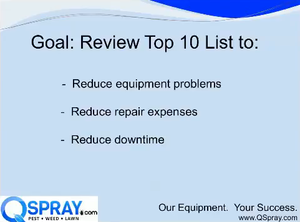Experience Pays: Top 10 Avoidable Spray Equipment Problems And Ways To Avoid Them
Posted by Andrew Greess on Jul 24, 2018
Years of Experience tells us that over half the problems experienced by lawn spray equipment and pest control spray equipment is avoidable! How you must be thinking? Eventually all the equipment will start to leak, a sprayer valve is bound to break, commercial spray equipment is used hard daily and it's just a fact of our industry that it will break, right?
We sell and repair professional spray equipment day in and day out, so we see all the problems they have and we have learned a few tricks and tips over the years to help prevent some of the common problems that many companies experience.
Over the course of this video series we may cover a topic that doesn't apply to you cause you’re the boss and not the technician or vice versa but, stick with us cause we're sure there will be a topic covered in this series that will help you down the road sometime or maybe right now!
Topics covered in the series are:
- Choosing the Right Components
- Importance of Good Design
- Electric Backpack
- Sprayer Pump
- Sprayers
- Filters
- Tanks
- Filtration is Critical to Design, Operation, Maintenance
- Why Cleaning is So Important
- Sprayer Pressure
- Preventative Maintenance is Key
- Pre-Flight Checklist
- Be Prepared with Emergency Repair Kits
- Preventing Freeze Damage
- Policies & Procedures
You can also check out the slides from the Top 10 Avoidable Spray Equipment Problems Seminar here
Check out more blog posts at Qspray.com for more informative videos.
Andrew Greess: Today, we are going to talk about the "Top 10 Avoidable Spray Equipment Problems." My goal today is to help you reduce your equipment problems. We see lots of equipment problems that are totally avoidable, completely avoidable. That's what we are going to talk about today.
We're going to try to help you reduce your repair expenses in repairing this equipment and also reduce downtime because almost every repair results in significant downtime. We have a company called Quality Equipment & Spray on our website, qspray.com, and we fix pest control, weed control equipment all day, every day.
When we started looking at it, we noticed lots of common themes and common causes of these spray equipment problems. What we realized is a lot of them, I would say well over half of the problems we see are completely avoidable. What I've tried to do is put them in categories so that they're easy to remember and easy to follow. I'm going to share those with you today.
Hopefully, we'll save you some time, save you some money, and increase your awareness so you know how to start looking at equipment to anticipate problems and prevent problems. When my kids were little, I always used to say, "What's the easiest way to clean up a mess? Don't make it in the first place."
It's the same with your pest‑control or weed‑control equipment, so that's what we're going to talk about.
A couple of preliminary ground rules. I'm going to share lots of examples. I got some really good photos of some problems and issues, but not everything I share is going to apply to you. Hopefully, you'll find some things, you'll find some nuggets, and learn some things.
Some of the things I talk about are going to be the technician's responsibility to check, and some are going to be the employer's responsibility. Again, not everything applies to you. Some of the things we're going to talk about apply to a company with one vehicle. Some apply to companies with many vehicles.
If it doesn't apply to you, just wait for the next one. I'm pretty sure you'll find something that's valuable. I hope you will, anyway. Let's get started.
The first point is start with the right components. I used to be with American Express. The executive vice‑president of marketing used to say, "You can't make chicken salad out of chicken."
That's one of the things we see all the time, companies selecting the wrong equipment or the wrong components. I've got some examples, here. Some are obvious, and some are not so obvious.

